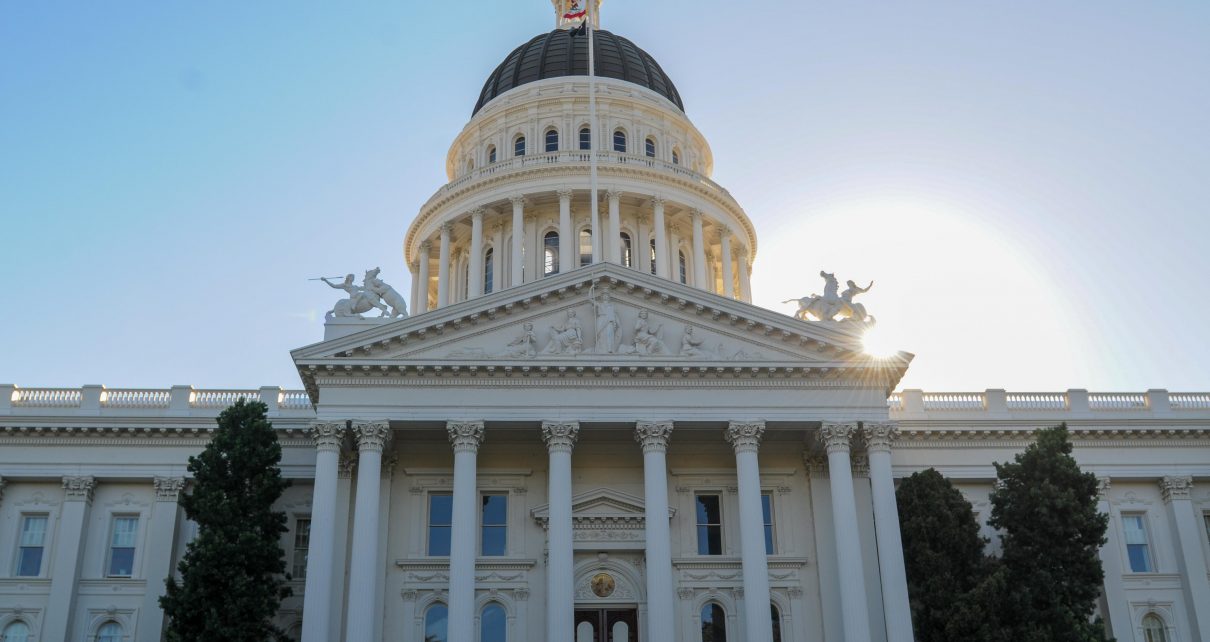
California State Capitol. (Photo: Kevin Sanders for California Globe)
Republicans at a Crossroads on Abortion
The new ‘Third Rail’ of politics?
By Martin Marks, April 29, 2023 9:06 am
For the longest time, the issue of Social Security was considered the “Third Rail” of politics. Touch it in any way—even if common sense adjustments were your call, and it all but guaranteed electrocution at the polls. And that still holds true today. A sizeable block of voters having paid into and now collecting social security benefits, or those hopeful to be collecting as part of their retirement plans one day, simply do not want the program touched in any manner.
A new third rail has emerged since the heralded Dobbs v. Jackson Women’s Health Organization decision was handed down by the U.S. Supreme Court in June of last year, which essentially overturned the 1973 decision Roe v. Wade that guaranteed a woman’s right to an abortion anywhere in the United States.
Of course, the spin from mainstream media, various advocacy groups, and most importantly Democrat political consultants, insinuated if not proclaimed that by virtue of the Dobbs decision abortion would now be illegal in the United States. While this spin might have been a shrewd political ploy, it was hardly the truth. Effectively, Dobbs remanded the laws governing abortion back to the legislative branches of government—specifically state legislatures–instead of allowing the law to be created de novo by the courts as was done with Roe in 1973.
Certainly, there already existed plenty of state laws—many on the books for decades—governing and restricting abortion that had been squelched by the Roe decision, just waiting to re-emerge like a hibernating bear upon the much-anticipated overturn of Roe. There were also state officials around the nation eager and ready to take new legislative actions restricting abortion if only given cover by the Court—in this case by virtue of Dobbs v. Jackson.
To be sure, abortion has been a divisive moral and political issue for decades that has played into many election battles at various levels of government. But with the rendering of the Dobbs decision, and the reemergence of laws already on the books or newly being enacted or planned, the abortion debate has seemingly taken on an even broader role in American politics.
What evidence is there of this broader role and what are the implications for the balance of power in American politics moving forward?
The obvious answers lie with first getting a snapshot of where American public opinion is presently on the abortion issue and then perhaps looking at the most recently completed 2022 mid-term elections to see how that issue might have affected results. Further—and this is most important—should either major American political party perhaps compromise potentially strongly held moral beliefs in order to maintain or regain power in the houses of government by virtue of the answer(s) to this critical query.
Attempting to get a feel for American public opinion on the abortion issue might not seem as easy as it ought to be. It depends on who is doing the asking and how the question or questions are worded. Yes, even pollsters have an agenda and that can definitely skew results.
In very broad terms, a Pew Research poll conducted at the time of the Dobbs decision in June of 2022 revealed that 61% of American adults believe that abortion should be legal in all or most cases, while 37% believe that abortion should be illegal in all or most cases. As we all know, the abortion issue is a bit more nuanced than just an all or most cases perspective, yet this more than 3:2 divide—a ratio that Pew reports has been fairly consistent over the last quarter century, is hard to ignore.
More specifically though, a recent Marist poll commissioned by the Knights of Columbus (read into that any way you wish) confirms that the split between those adults that identify as Pro Choice (61%) vs those that identify as Pro Life (39%) once again falls along that 3:2 divide. Yet, here is where the many nuances play out. This Marist poll revealed that a vast majority (69%) of Americans support limiting abortion to the first trimester of pregnancy, while only 21% support abortion on demand at any time.
So where exactly do Americans stand on this continued hot button issue? Well, once again it depends on just whom is being asked and how the questions are phrased. While it seems that a majority of Americans favor allowing legal access to abortion with some restrictions, the intriguing political question is, how does one’s stance on abortion influence one’s vote?
Let’s take a look at the mid-term elections of 2022 which occurred just after the rendering of the Dobbs decision. In the months leading up to Election Day most political pundits on both sides of the political spectrum were anticipating the proverbial Red Wave of sweeping Republican victories from sea to shining sea. Inflation was at a 40-year high, gas prices where through the roof while domestic oil exploration and production was being curtailed, the withdrawal from Afghanistan was bungled, our southern border was as porous as it had ever been, and we had a relatively new president whose cognitive status was being called into question and whose approval ratings were deservedly upside down. All of this was occurring with the Democrats in control of the White House and both houses of Congress. So, was there a Red Wave? Hardly. At most, the result of the election of 2022 could be described as a red dripping faucet.
What happened?
In order to sort out the possibilities, it might be best to compare the pre- and post-election polling of what really mattered with our voters.
Prior to the election, SSRS Research produced a snapshot of what mattered most to voters in the last week of October 2022. Here’s what they found:
- Economy and Inflation 51%
- Abortion 15%
- Voting Rights/Election Integrity 9%
- Gun Policy 7%
- Immigration 6%
- Climate 4%
- Crime 3%
It is not too surprising to see The Economy at the top of the list. It usually is. Note that Abortion was the most important issue to only 15% of these voters in polling prior to the election.
Now, let’s take a look at polling of what mattered most to voters as they actually cast their ballots by virtue of post-election polling conducted by ABC/Washington Post on Nov. 8, 2022.
- Economy and Inflation 31%
- Abortion 27%
- Gun Policy 11%
- Immigration 10%
- Crime 11%
- Climate 9%
So, while the economy and inflation remained the most important issue, the spread between it and abortion dropped dramatically from 36 percentage points to only 4. Regardless of how you view any polling institution, a nine-fold drop ought to catch your eye. It is obvious that the abortion issue–perhaps by virtue of Democrats shrewdly using it in their campaigns—factored more predominantly than anyone expected and certainly to the detriment of the anticipated Red Wave.
Further, and perhaps anecdotally, voters in five states (California, Kentucky, Michigan, Montana and Vermont) had the chance to weigh in on ballot measures pertaining to abortion in the election of 2022. The pro-abortion rights side prevailed in all five.
One could also posit that the hulking shadow cast by former President Donald J. Trump influenced voters in 2022, but that is an essay for another day……
Republican controlled state houses continue to deliberate on and enact more and more restrictive abortion laws. There is even talk of the potential for nationwide abortion restrictions enacted by the federal government should Republicans one day control both houses of Congress and the White House. The issue is clearly not going away. But can Republicans hope to regain this level of power in light of prevailing attitudes on the abortion issue and especially how things played out in 2022?
The threshold question might soon be, will Republicans be willing to compromise if not sacrifice strongly held moral beliefs on abortion in order to maintain any hope of recapturing national power so that so many other issues they champion can see the light of day?
One thing is for certain. For the foreseeable future, campaigning Democrats will continue to bludgeon, if not attempt to electrocute their Republican opponents with this new third rail, because as far as politics goes, they know they have a winner. How long that lasts remains to be seen.
- Just How Effective Was The Abortion Debate in The 2024 Election? - November 18, 2024
- Federal District Court Holds UCLA Accountable for Campus Antisemitism - August 20, 2024
- California Supreme Court Hears Arguments On Proposed Tax Initiative - May 13, 2024





Democrats need to admit they want to kill babies. Instead they demand we agree with them that they are really not killing babies. This is the sticking point. Just can’t get past this.
Plus male supporters need to come clean about wanting to avoid 18 years of child support then they claim they too “support” baby-killing. We are talking in circles around each other. That is the fog of this war.
This “debate” will never end until we come to a consensus on what constitutes a “person.” Which may never happen. For the people in favor of baby killing, they can only justify it so long as they can dehumanize the very real human life that is killed as a result of an abortion.